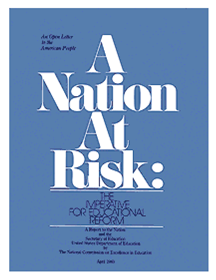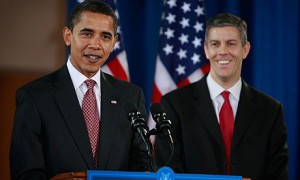Kyle DeAngelis (Class of 2015) and Professor Chris Bjork

Educational historians generally identify the publication of A Nation at Risk as the start of the corporate school reform movement.
In 1983, the National Commission for Excellence in Education published a report titled A Nation at Risk, which insisted that American schools were chronically failing, posing an imminent threat to America’s economic and military supremacy at home and abroad. Since the publication of the report, a bipartisan consensus has emerged around the imperative for structural school reform. The series of reforms that have resulted from this consensus are heavily influenced by business and neoliberal economic theories, earning this movement the nickname “corporate school reform”.
The agenda of corporate school reform emphasizes test-based school accountability, high standards, and school choice as the main levers to improve educational outcomes. The reformers contend that students should be tested annually, and their scores on these standardized tests should be used to punish or reward teachers, principals, and schools accordingly. Rigorous academic standards should be set for all students and no excuses should be accepted for failure to meet these standards. Reformers promote vouchers, charter schools, and other policies that increase choice in education, arguing that competition among schools will drive improvement. Critics of corporate reform have pointed out that these reforms are not as effective in practice as they appear to be in theory, and have had several unforeseen negative effects on American education.
In 2002, President George W. Bush signed the No Child Left Behind Act into law. Passed by Congress with overwhelming bipartisan support, NCLB took the test and punish accountability measures touted by corporate reformers to scale and promoted school choice. In 2009, President Barack Obama revealed his major education initiative, Race to the Top, which continued to embrace the same education reforms as NCLB.

Like their predecessors, President Barack Obama and his Secretary of Education, Arne Duncan, both embrace corporate school reform.
My project with Professor Chris Bjork involved the creation of a new senior seminar in education to be offered in the spring of 2015 on the subject of corporate education reform. I spent several weeks reading books, essays, government reports, research articles, and news pieces on the subject of corporate school reform. I used this research to create a schedule of reading for Professor Bjork’s seminar. Next spring, students in “The Corporatization of American Education” seminar will read from both proponents and critics of corporate school reform and analyze the arguments put forth by all sides of the debate. Students will investigate the neoliberal theories underpinning corporate school reform, the research regarding accountability and school choice, the political history of school reform since 1983, and the influence of teachers unions and billionaire philanthropists on educational policy. At the end of the course, students will research the potential for alternatives to corporate school reform. Ultimately, students will gain a comprehensive and critical knowledge of U.S. school reform over the last three decades.
